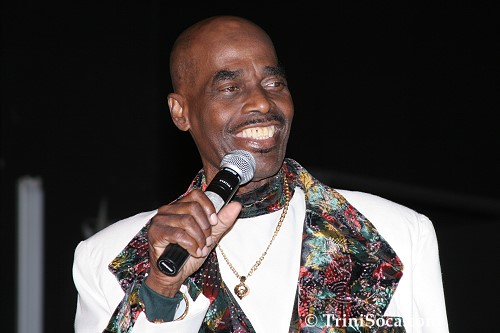|
|
The Mighty Duke Speaks
 The Mighty Duke
The Mighty Duke
TriniSoca.com Reporters
Recorded: on September 27, 2007
Posted: October 03, 2007
< Prev | 01 | 02 | 03 | 04 | 05 | 06 | Next >
TRINISOCA.COM: How was your work received by some of these international audiences?
DUKE: Very good. One of the things that I tell people is that as long as you are in an English-speaking country and your diction is good you can get your message across and the people will appreciate Calypso. Once they understand what you are saying, that is the important thing. Once they do and you are saying something they will appreciate it.
TRINISOCA.COM: Your work not only touches local topics, you also have a strong international focus. Some of your songs speak in support of African Liberation on the Continent. Where did that come from? Were those topics alive locally?
DUKE: No, as I said, my Black consciousness was awakened as a little boy growing up in Point Fortin. It started from there and as you grow older you begin to read more, you look around and you see what is happening in the world and so on. You begin to express your thoughts of what you see and of what you think is right. Let's face it, apartheid was one of the worst things that happened to people and of course I elaborate on that a lot. That is something very important [that] they should teach the children about because I think that all Black children should know their history. Not the history in the sense of West Indian history or English history or American history but Black history. Because of my reading and seeing things and experiencing things, that helped me.
TRINISOCA.COM: That is something I see as one of the most important aspects of the Calypsonian: to highlight issues and elements of history that may not be so readily available in society.
DUKE: For instance, once I am doing a serious song and its something to teach the children, I do a lot of research. I would go to the library and spend weeks looking for information so that when I say something, I am almost on it. I may not hit it one hundred percent but I will be around ninety-something ... I will be bordering on it. I think this is what most artistes should do. A lot of artistes sometimes make statements in song that are blatantly untrue. That is a bad thing to do because when people hear it they tend to believe you and if they believe something that you said that is not true it is terribly wrong. You must always get your facts straight so that when you say something you know, well yes, they are not hearsay but this is the fact. That is something that has helped me a great deal.
TRINISOCA.COM: I had the privilege of hearing your song "Teach The Children" for the first time at your tribute concert during the Emancipation Celebrations recently. What year did you write that song?
DUKE: That was done around the early seventies.
TRINISOCA.COM: That is an excellent song. What sparked it?
DUKE: Memories sparked that song in the sense that I was never taught these things. As a child, I didn't know much about Africa except, as I say, the Tarzan story and that sort of thing. I was taught English history, Roman history ... you name it; but I was taught nothing about Africa except for instance, people were born slaves and they came from Africa. After I got the knowledge and understanding of what is happening, I wrote the song.
TRINISOCA.COM: I would certainly say that the song is just as relevant today as when you sang it in the seventies.
DUKE: Thank you. When I first sang "Teach The Children" here in Trinidad I was booed in the Calypso tent. I remember that year 'Shorty' and I had a tent called "The Professionals" on Frederick Street in Port of Spain and when I sang it there for the first time, I was booed. It didn't dissuade me because I knew it was a good song. Once I am convinced myself that this is right, nothing you do or nothing you say could sway me away from it. I knew it was a beautiful song so I didn't really take them on. I did the same song in Madison Square Garden and I got a standing ovation, so I knew I was on the right track.
TRINISOCA.COM: In your own collection what would you say are some of your personal favorites?
DUKE: "Teach The Children" was one of my favorite songs. Each of my songs has its own value. Even a party song has its own value. My wife would tell you that sometimes I would sit down and listen to my songs and I would say, "Wow, I wrote that?" I guess during the time you are writing it you are inspired and when that time is gone you put it down and it's gone. You listen to it again and you say, "Wow," and you wonder where those thoughts came from. It's a good thing to sit and work and then listen to your work years after. You realize it was relevant now as it was then. A lot of my songs I sang years ago, if you play them now, you would think they were written yesterday.
Continue...
< Prev | 01 | 02 | 03 | 04 | 05 | 06 | Next >
|

|